Why Myanmar people believe there is Chinese involvement in Myanmar coup
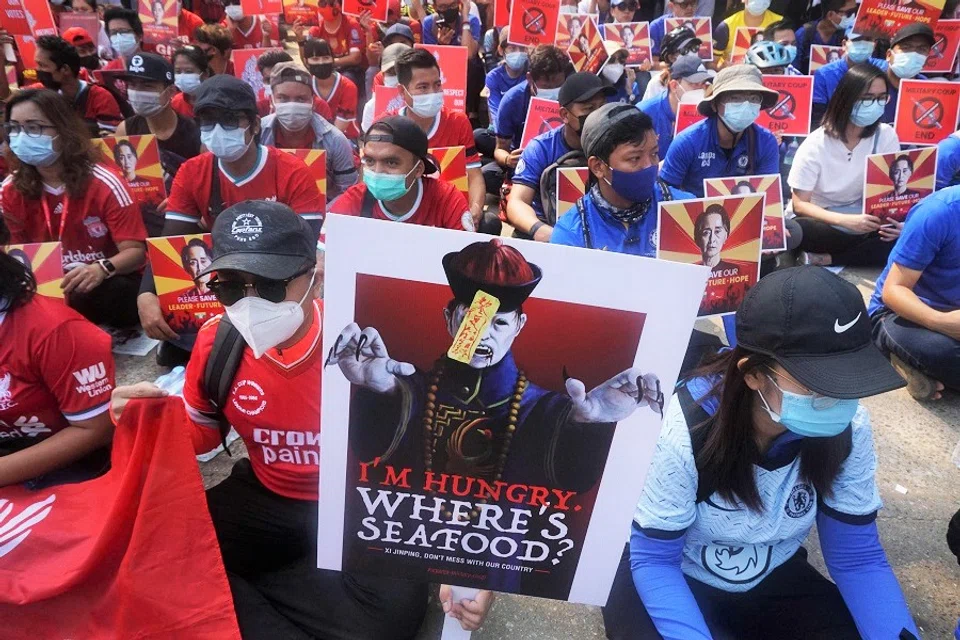
On the night of 17 February, 17 days after the start of the Myanmar coup, state railway workers protesting in Myanmar's central city of Mandalay were aggressively dispersed by the military. But a detail picked up by a hidden camera caused more of a stir: the soldiers were marching to the count of "one, two, three, four" in Mandarin.
Myanmar people who do not speak Mandarin may not have picked up the thick Myanmar accent spoken with the Chinese words. In their minds, the words alone are enough to confirm the rumour about China sending troops to assist the Myanmar military coup in suppressing the demonstrations.
Chinese involvement suspected at every turn
Since the coup started, China, who has always maintained close ties with Myanmar, has been swept up in a maelstrom of public opinion.
On 9 February, rumours that five Chinese cargo planes with Chinese IT experts onboard had arrived in Myanmar to help the government take control of the internet made their way onto Myanmar social media platforms. On day one of the coup, the Myanmar military had shut down the nation's telecommunication networks at midnight, only restoring partial internet access later that evening. Internet and mobile networks were plagued with erratic communications throughout the ordeal. Facebook, Myanmar's most widely used social media platform, was also blocked for several days, and a large number of netizens flocked to Twitter as a result.
On 10 February, a day after the Chinese IT experts rumour surfaced, people began protesting in front of the Chinese embassy. That afternoon, the China Enterprises Chamber of Commerce in Myanmar released a Chinese statement stating that the plane was only carrying normal goods such as seafood. Later that night, the Chinese embassy in Myanmar reposted the statement in the Myanmar language but it did not resonate well with Myanmar society. Thereafter, the embassy set regional restrictions on its social media page, blocking access to people who logged onto social media platforms via VPN. This further added doubts and questions in the minds of the Myanmar people.
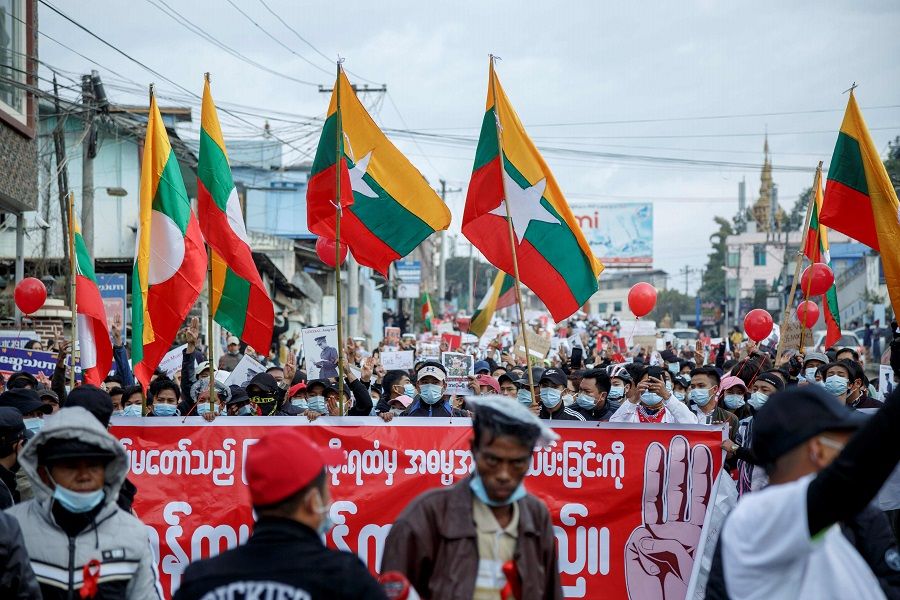
On 11 February, the embassy removed the regional restrictions on its social media page, while Myanmar Airways International, the airline which had transported the seafood, attempted to clear the air via its staff's social media account. But by that time, the rumours had escalated to a whole new level: the planes were believed to have also been delivering a large amount of arms to the Myanmar military. The number of protesters outside the Chinese Embassy continued to climb as well.
On 14 February, rumours intensified once again, saying that China was sending soldiers to Myanmar to assist the Myanmar military in putting a stop to the protests. Their evidence? A few photographs that showed soldiers with relatively fairer skin.
On 16 February, the text of a written interview that Chinese ambassador to Myanmar Chen Hai had given to five Myanmar media was posted on the Chinese embassy's social media page. Ambassador Chen had said towards the end of the interview, "These [The rumours] are totally inconsistent and malicious. We hope such rumours will not recur. If so, it only proves to have manipulation and instigation by forces with ulterior motives behind the scenes. The Chinese people are also concerned about these remarks, many of whom are complaining about them. We sincerely hope that the Myanmar people can distinguish right from wrong and guard against political manipulation, so as to avoid undermining the friendship between the two peoples."
But we have to think about why negative rumours about China are so easily presumed true in Myanmar.
Nonetheless, that same day, rumours persisted that Chinese IT experts had taken over Myanmar telecom provider MPT, just because there would be a string of garbled text resembling Chinese characters whenever a random message was sent to the MPT service portal number "7979". Netizens took this as evidence of Chinese IT experts gaining control of Myanmar's telecommunication network.
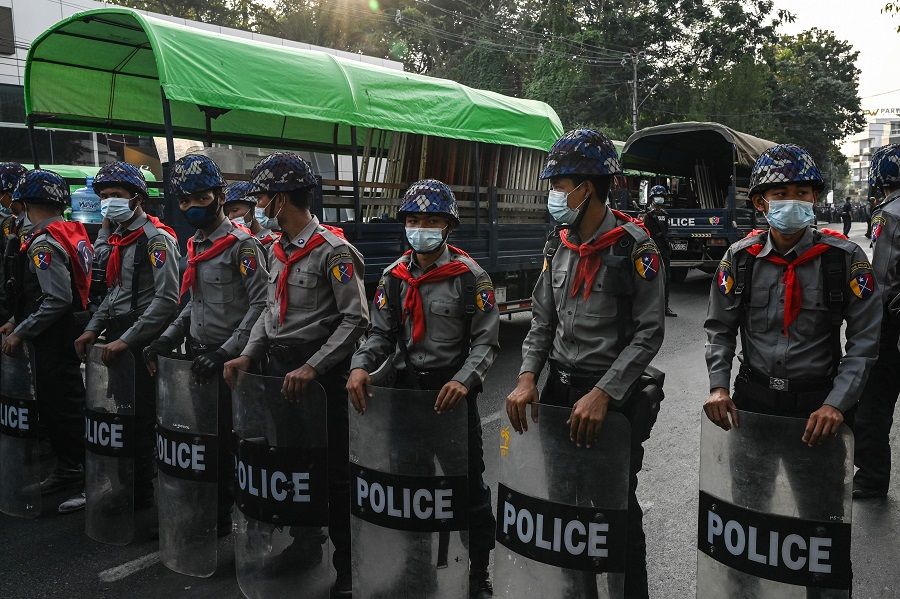
Actually, this was just a quirk of the system - when numbers or texts outside of what is designated are sent, the system sends garbled text as it is unable to recognise the message. Besides, this did not happen for all MPT users and all text messages sent.
On 17 February, it was rumoured that fake Myanmar currency produced by the Bank of China had entered Myanmar. This rumour was paired with a photograph of bundles of kyat labelled "E.SUN Commercial Bank". E.SUN Commercial Bank is a Taiwanese bank with a branch in Myanmar. On the same night, the situation with the railway worker protests happened.
A market for rumours about China
Since 18 February, the Chinese embassy in Myanmar has been debunking rumours through social media. However, looking at the responses, people are clearly biased. Ministries, academics, and media in China are more interested in whether any persons or groups are manipulating these rumours, and have expressed unhappiness and criticism over how easily the Myanmar people believe them. But we have to think about why negative rumours about China are so easily presumed true in Myanmar.
But from the perspective of the people of Myanmar, given their emotional inclinations, they would feel that since China has dealings with everyone in power, that means China is only concerned with its own interests in Myanmar.
In keeping with one of its Five Principles of Peaceful Coexistence, the Chinese government does not interfere with the internal governance of other countries, and does not express its views on any political powers in other countries. For instance, the Chinese embassy quickly congratulated the National League for Democracy (NLD) after it won in the 1990 elections, but when the military rejected the results of the election and put Aung San Suu Kyi and NLD leaders under house arrest, China continued to maintain friendly relations with the military junta. And in 2015, after the transfer of power and the NLD government took office in Myanmar, China also built close ties with the NLD.
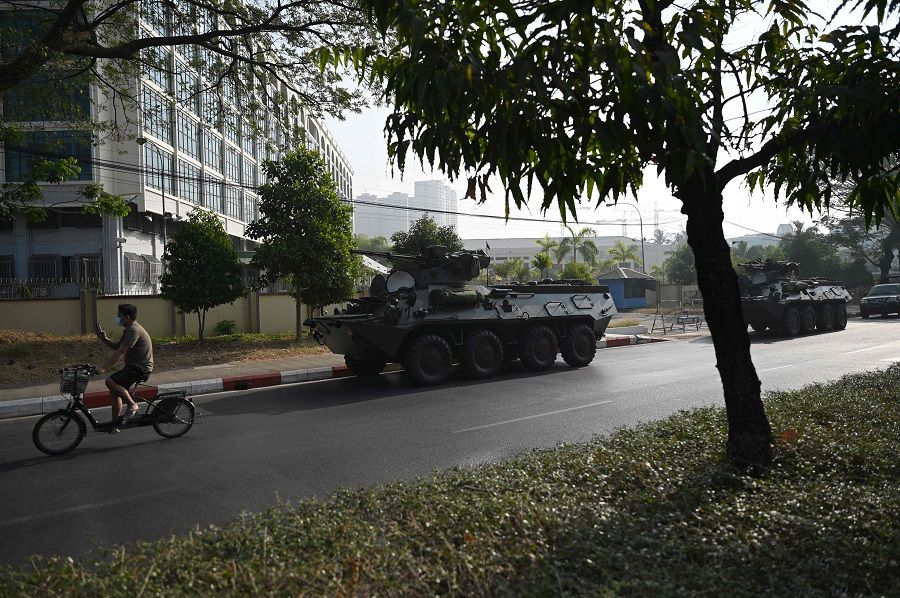
Over the past five years, China has been the most frequently visited country by State Counsellor Aung San Suu Kyi. Following the military coup, Ambassador Chen said: "Both the National League for Democracy and the Tatmadaw maintain friendly relations with China. The current development in Myanmar is absolutely not what China wants to see."
But from the perspective of the people of Myanmar, given their emotional inclinations, they would feel that since China has dealings with everyone in power, that means China is only concerned with its own interests in Myanmar. Furthermore, the military with its poor image has been in power for long periods since 1988, and the Myanmar people generally feel negatively about China because they think China is more inclined to take care of its relationship with the military. And so, even with no basis, most Myanmar people tend to think that China supported this latest military coup.
On the day of the coup, some Chinese who have dealings with Myanmar were discussing whether the China-funded Myitsone Dam project - put aside for nearly 10 years - might be rebooted, while others were already busy finding out about the new people taking over various ministries in preparation for work transition.
Although the Chinese government has stayed neutral, the extremely "realist" ways and attitudes displayed by Chinese media and academics have firmly convinced people that China supports the coup. For example, a well-known Chinese media ran an article titled "Myanmar Coup: Now or Never" (再不政变就晚了), while Chinese academics also wrote essays seeking a legitimate basis for the coup.
On the day of the coup, some Chinese who have dealings with Myanmar were discussing whether the China-funded Myitsone Dam project - put aside for nearly 10 years - might be rebooted, while others were already busy finding out about the new people taking over various ministries in preparation for work transition.
Young Myanmar Chinese add to anti-China sentiment
The Myanmar Chinese community has actively participated in the protests against the coup, and these young Myanmar Chinese also initiated actions expressing anti-Chinese Communist Party sentiments in the early stages of the coup, based on the fake news that China objected to condemning the military at the UN.
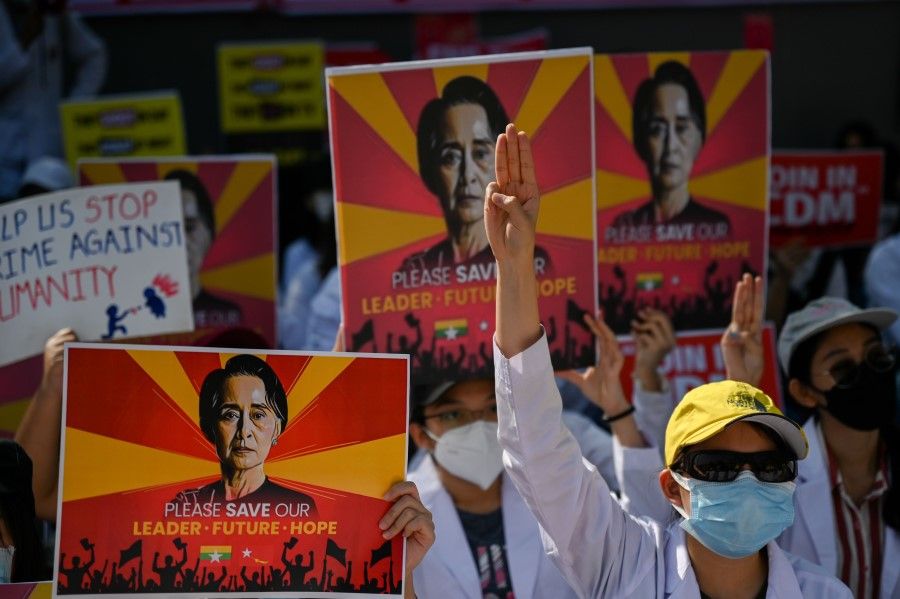
And when they started groups on Chinese social media to plan demonstrations, the very next day they started receiving notifications that their groups had been reported. They also found out through social media that many Chinese nationals working and doing business in Myanmar were opposed to their demonstrations and protests. Given such real-life examples, the Myanmar Chinese community that previously maintained close ties with their ancestral land is starting to waver.
China will face more complex challenges in Myanmar.
As Chinese President Xi Jinping said in 2018: "The changes we are encountering in the world are unseen in a century." The situation in Myanmar is one example of such changes. And while some academics say the Myanmar coup is an opportunity for China to adjust its traditional diplomatic policy to adapt to this major change, others feel that looking at China's overall situation, there are more pros than cons to its current principle of non-intervention.
There is no conclusion yet to the above discussion, but the count of "one, two, three, four" in Mandarin by the Myanmar troops, the Myanmar people's attitude towards China, as well as the confusion the Myanmar Chinese are experiencing towards their ancestral land, all show that however the political situation in Myanmar develops in the next few years, China will face more complex challenges in Myanmar.
